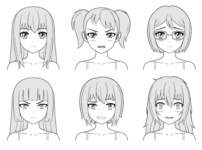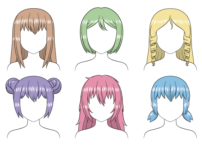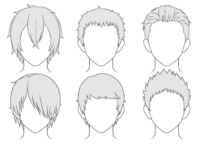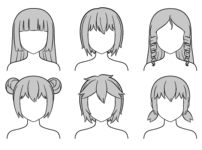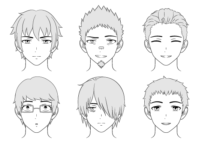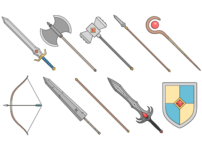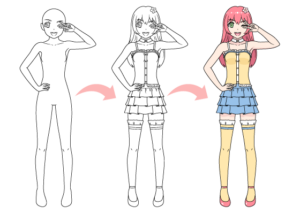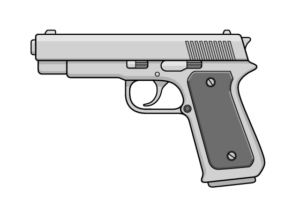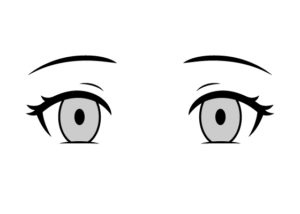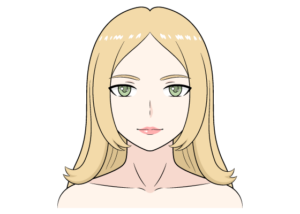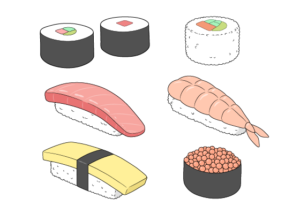How to Draw Anime Poses Step by Step
This tutorial explains the basics of drawing different poses. The instructions it provides can apply to anime and manga or to more traditional art styles.
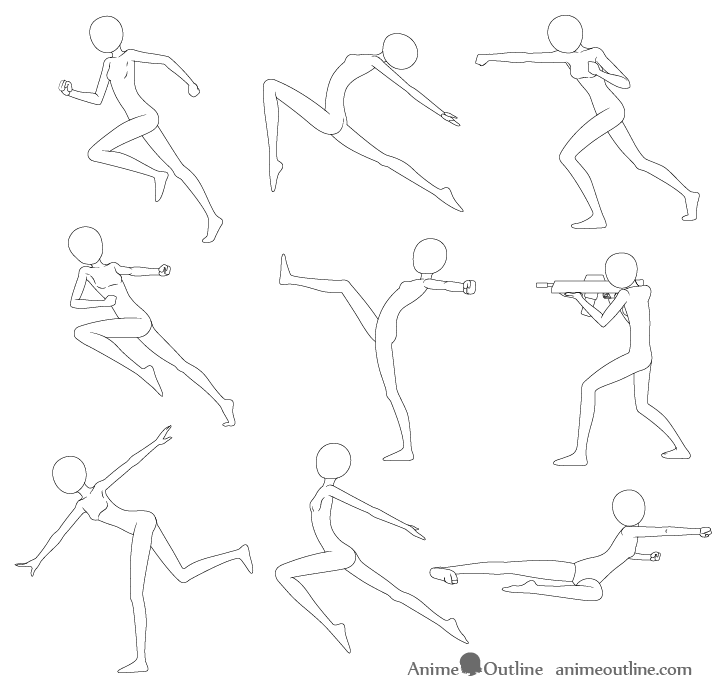
Drawing an anime or manga character in a given pose can be quite challenging. To make things simpler (especially for beginners) this tutorial shows examples from fairly easy to draw angles. It also show how to use mannequin like characters for getting the pose without any of the details such as the facial features, clothes, hair, etc…
The “mannequin approach” mentioned earlier lets you draw various poses quickly making it easier to find the right one for the character you want to draw. It can also help avoid having to do excessive erasing in case of a mistake.
If for example you fully draw out the details of the head and then move on to the body you may realize it does not quite have the right angle. This means now having to erase all of the facial features when you could have caught the mistake much sooner if you were to draw a basic outline of the entire body.
For more common drawing mistakes and good practices also see:
Importance of Proper Poses
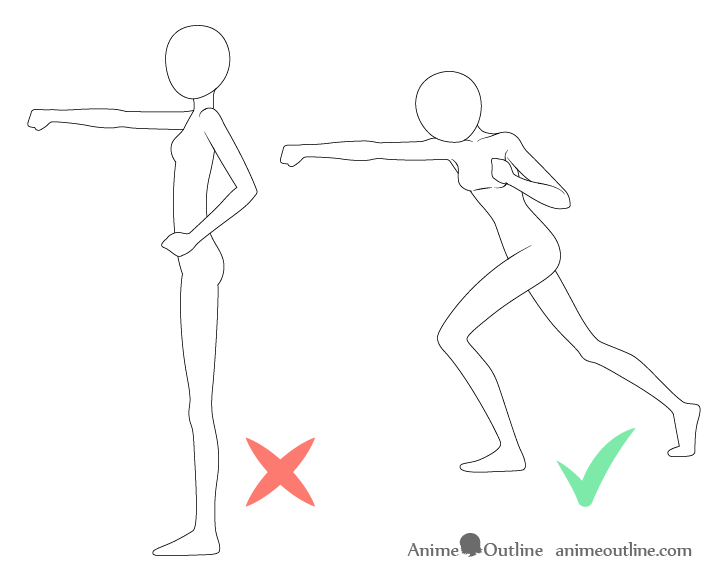
Even if you are a reasonable good artist an improperly drawn stance can greatly detract from your drawing and the message your are trying to convey to the viewer.
For example in the two punch drawings above the first one looks like a person holding their arm out while the second looks like they are actually punching.
It’s very important to properly convey the action or stance you want to show. Without that an even otherwise well done drawing won’t look right.
Drawing Specifics of this Tutorial
For the more generic/common styles of anime and manga the bodies tend to be drawn similar to those of real people. This is how the examples in this tutorial will be drawn as well. The only real difference is a slightly larger and rounder head (as is common in anime).
This means drawing as follows:
- Head similar in shape to an egg (slightly rounder)
- Hands drawn with fingers combined into one shape (sort of like mittens)
- Feet drawn as one combined shape (like when wearing socks)
Though it’s quite common to start the drawing of a person from the head the examples in this tutorial will start with the torso. In more dynamic poses getting it’s bend and/or twist first can make it much easier to place the rest of the body parts.
Another important thing you should do is draw light lines that you can easily erase (if drawing on paper). This will make corrections easier in case you make a mistake and it will also let you more easily erase parts of the “mannequin” if you want to add all of the details mentioned earlier over top of it. The lines in the examples have been made dark just so that they are easier to see.
Drawing a Running Pose
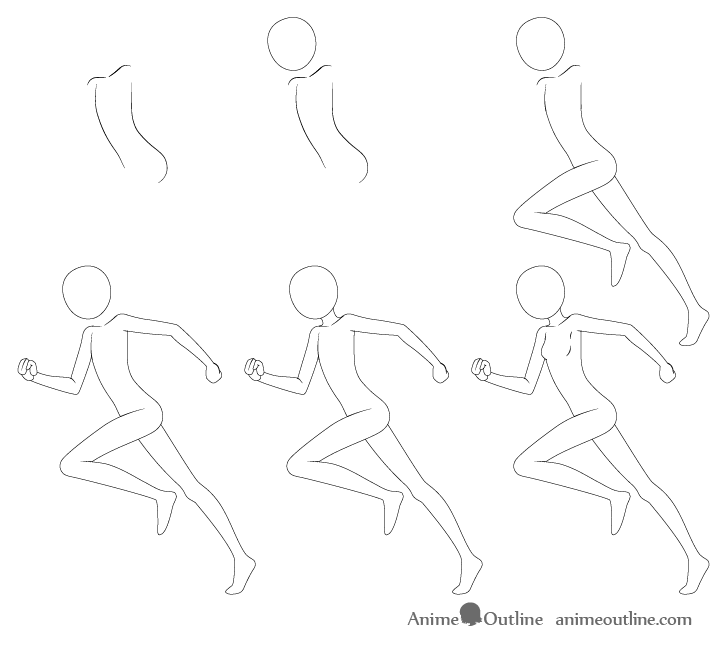
There are several common variations of running poses. A lot can depend on the type of character/event you want to portray. This particular pose is suited to sports.
Step 1 – Draw the Torso
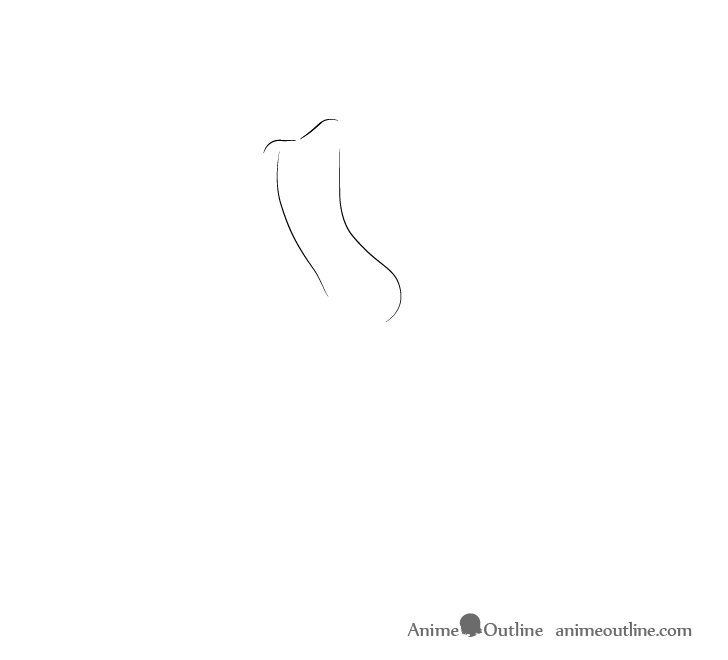
In this particular pose the torso will be drawn at about 3/4 angle. As this is a female character draw it with a bit of an hour glass like shape.
To show that the character is running position the torso leaning slightly forward. You can also draw a hint of the shoulders/collar bones to define it’s upper part. In this pose the shoulder closer to the viewer will be slightly higher up.
Step 2 – Draw the Head
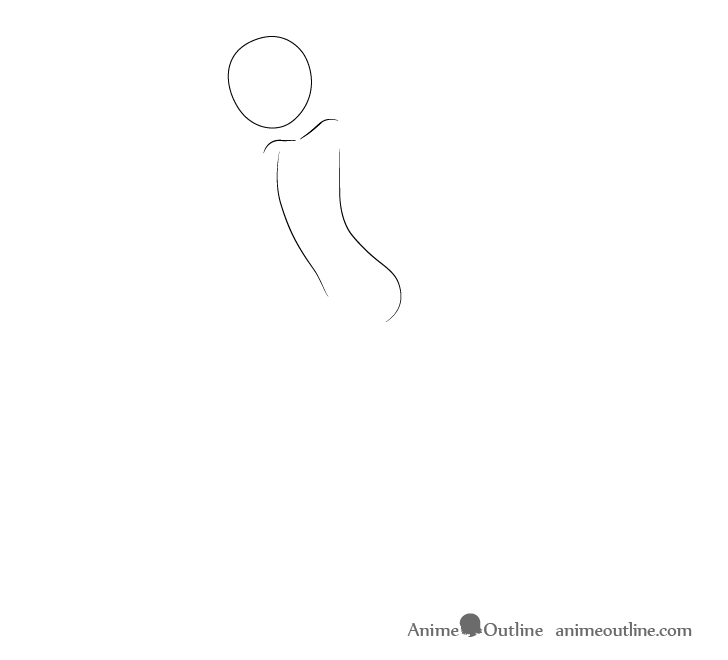
Draw the head leaning forward at pretty much the same angle as the torso.
Step 3 – Draw the Legs
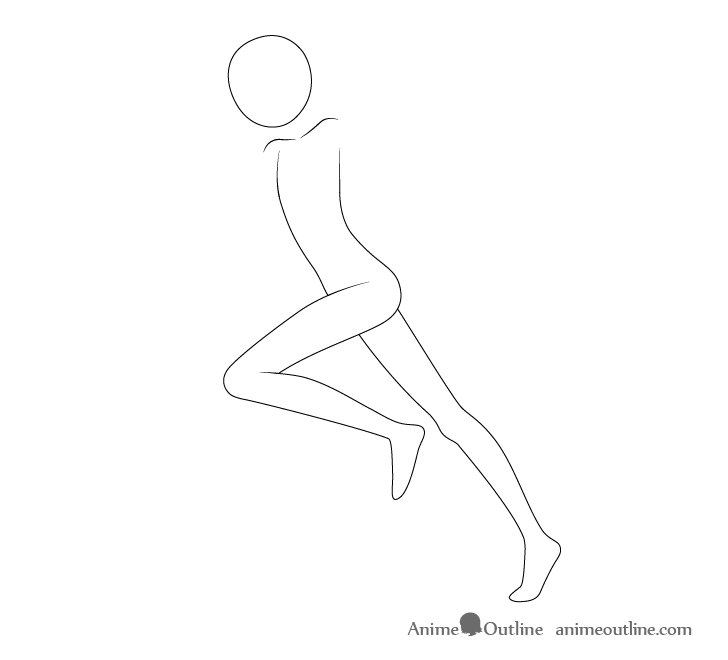
Draw the legs with one being bent into a sort of forward facing arrow (helps emphasize motion) and the other straight at about the same angle as the body.
The foot on the bent leg can be drawn in a fairly natural/relaxed position. The foot of the stretched out leg will be pushing off of the ground and should be on it’s toes.
Step 4 – Draw the Arms
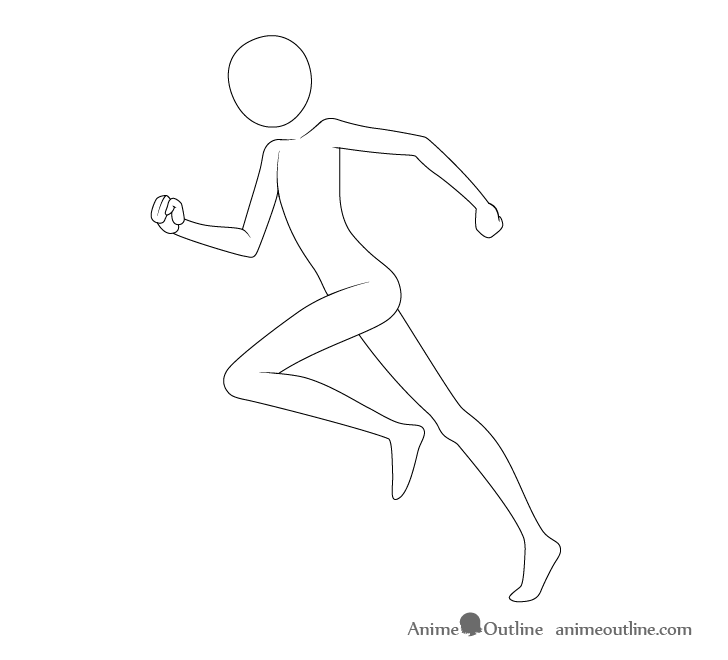
Draw the arms swinging in the opposite direction of their corresponding legs. For example if the left leg is going forward the right arm should swing backwards and vise versa.
Each arm should be bent with the hands clenched into fists. As already mentioned you can simply draw the hands as though they have mittens on them (no individual fingers).
For more on drawing hands see:
Step 5 – Draw the Neck
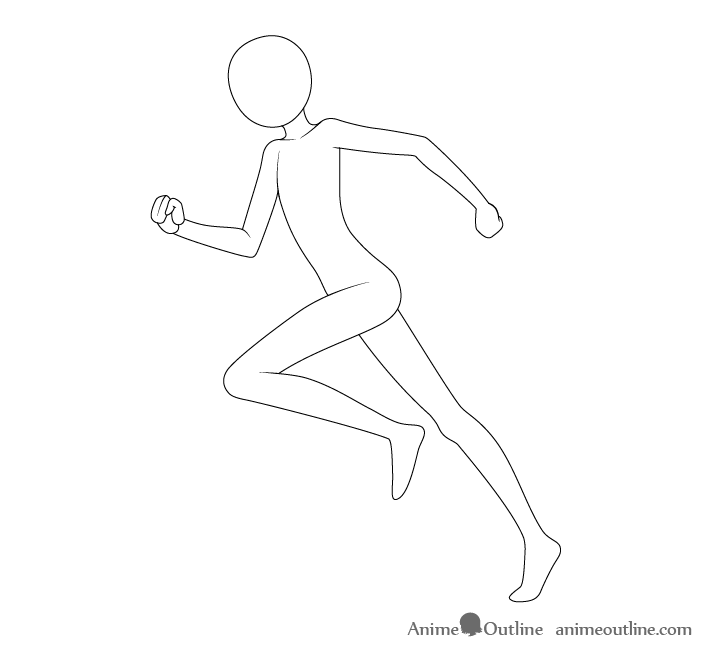
Draw the neck at pretty much the same angle as the head/body with roughly the same thickness as the upper part of the arms.
Step 6 – Draw the Chest Details
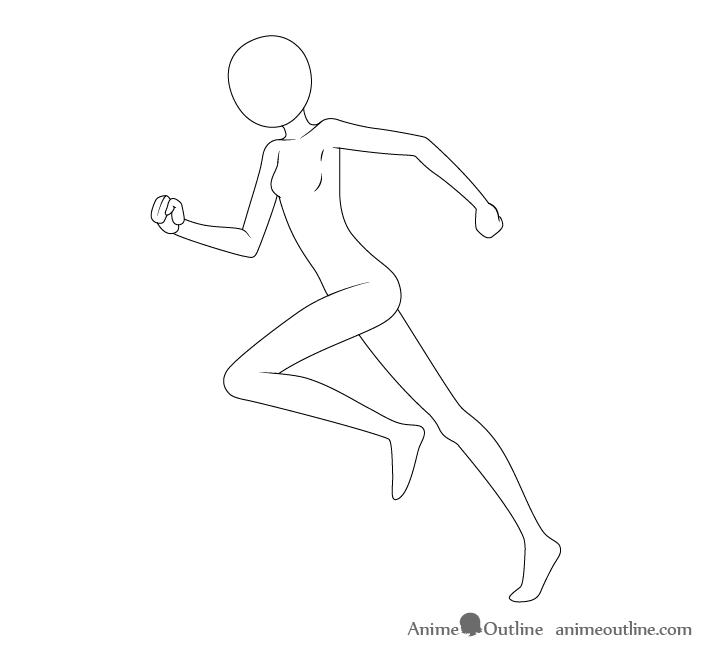
As this is a female character you can add some basic details of the breasts to finish the pose. Keep in mind that generally characters will be wearing clothes which will squeeze the chest area making it flatter.
Drawing a Ballet Pose
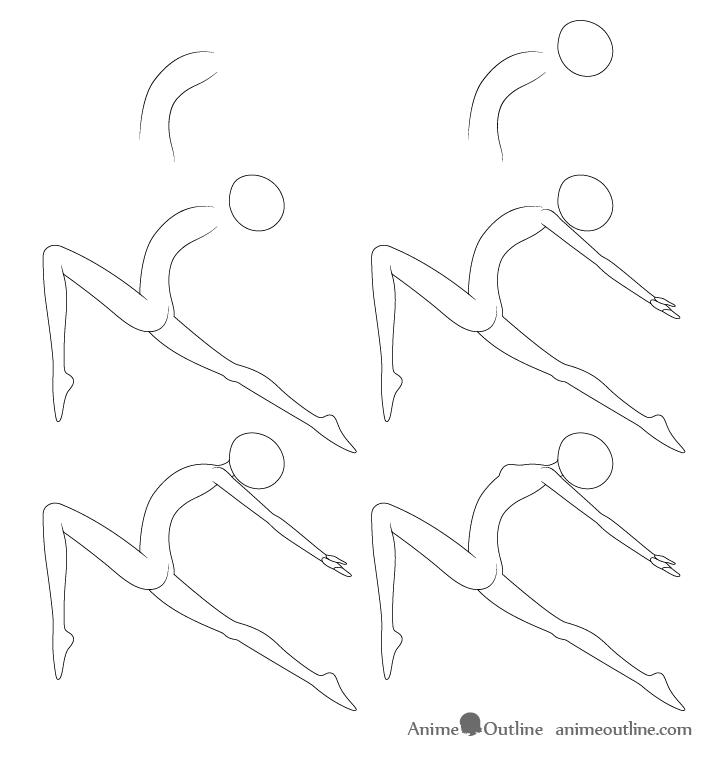
This pose is very characteristic of ballet dancers as it shows flexibility with the split of the legs as well as a bit of an artistic motion with the pulled back head.
Step 1 – Draw the Torso
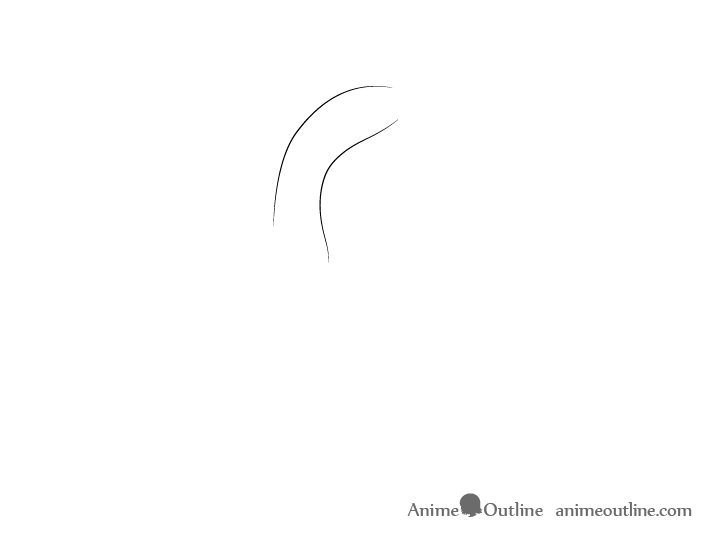
Draw the torso bending backwards and make it slightly narrower in the middle (curving inwards at the back) as compared to the top and bottom.
Step 2 – Draw the Head
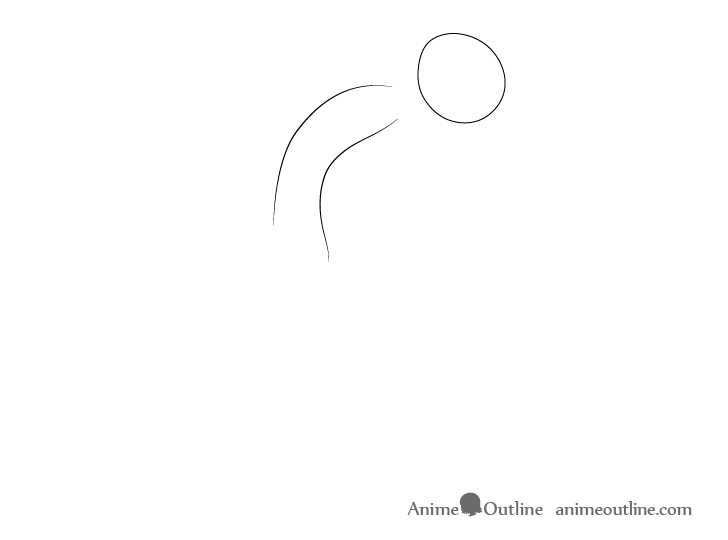
Draw the head tilted far back (almost upside down) with the chin pointing upwards.
Step 3 – Draw the Legs
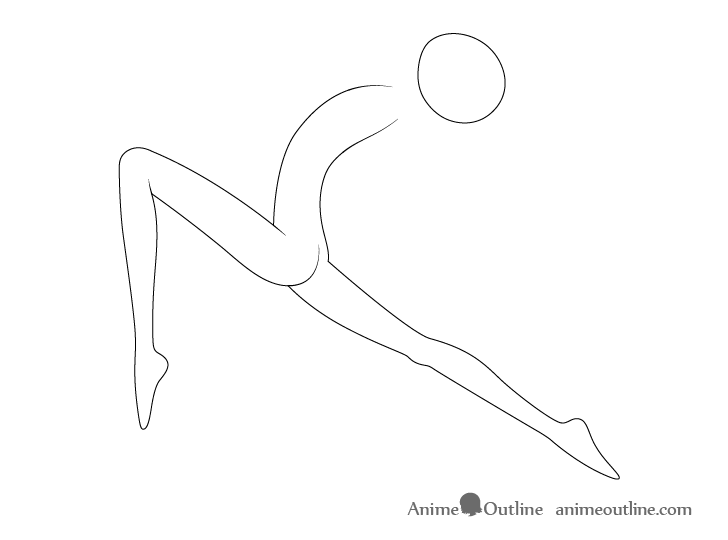
Draw the legs as as though the character is doing a split but with the front leg bent.
Draw the feet bent backwards like when the ballet dancer is standing on their toes.
Step 4 – Draw the Arms
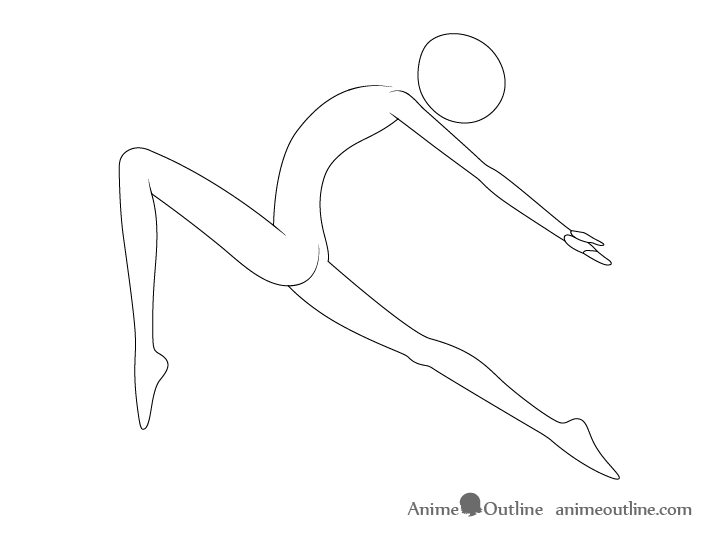
Draw the arms (or arm in this case) stretched out backwards with the palm of the hand being held upwards.
Though you could also draw the back arm it’s not really needed in this case as it can be pretty much hidden behind the front arm.
Step 5 – Draw the Neck
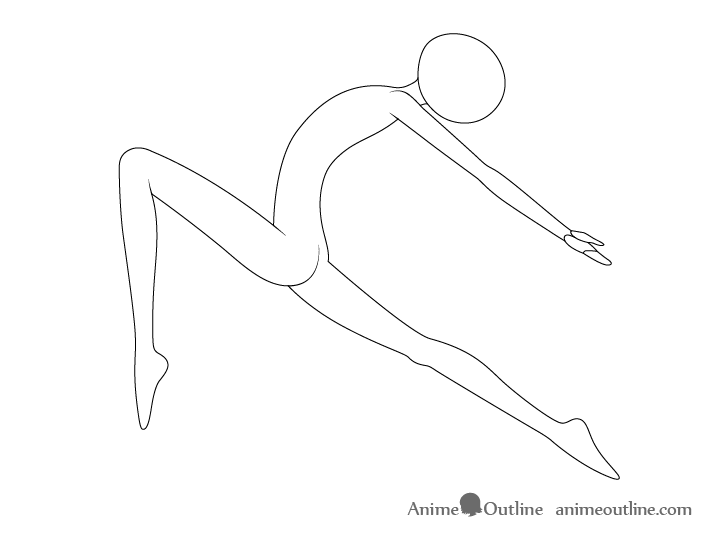
Draw the neck with it’s angle pretty much matching that of the upper part of the body. In this pose it will also be somewhat covered by the shoulders.
Step 6 – Draw the Chest Details
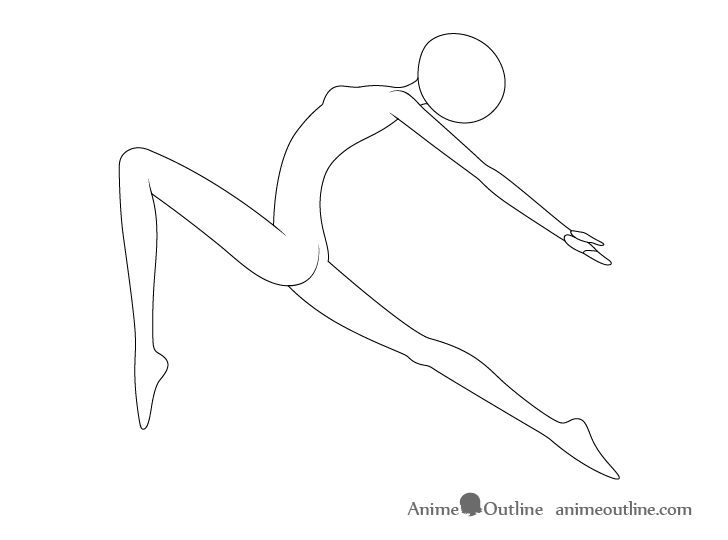
The chest will be both stretched out and squished by the clothes (if they were drawn) so draw it fairly flat.
Drawing an Punching Pose
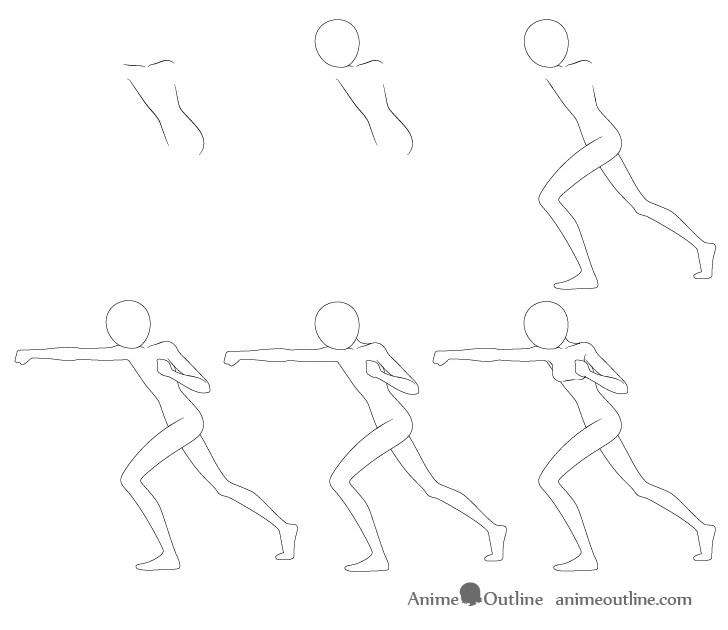
This pose is well suited to a boxing punch. Especially when hitting a bag during a workout.
Step 1 – Draw the Torso
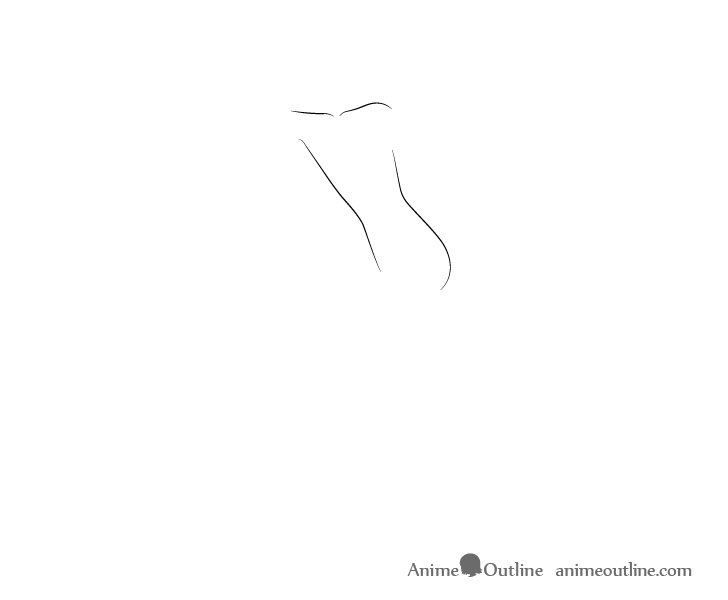
In this case the torso will be shown at about 3/4 view (similar to the running pose). Draw it with a slight hourglass like shape characteristic of a female character. You will also want to draw it leaning forward to show that the character is putting their weight into the punch and not simply holding their arm out.
Step 2 – Draw the Head
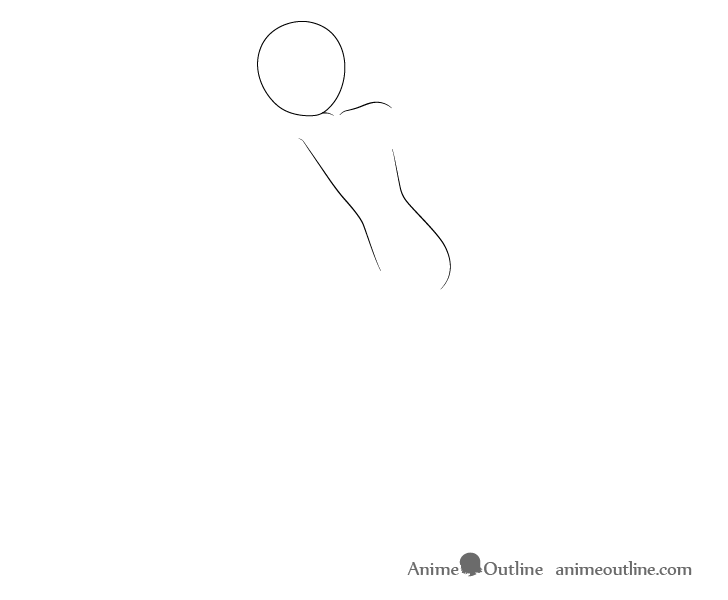
Draw the head tilted forward and lower down (basically tucked in).
Step 3 – Draw the Legs
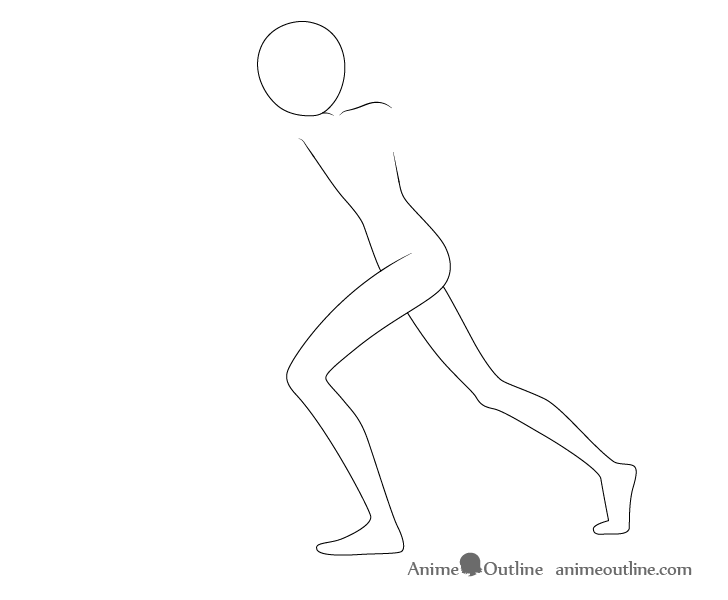
Draw the legs with both of them slightly bend (more so for the front leg) and a good distance apart. Make the forward leg stand flat on the ground with the backward leg being on it’s toes.
Step 4 – Draw the Arms
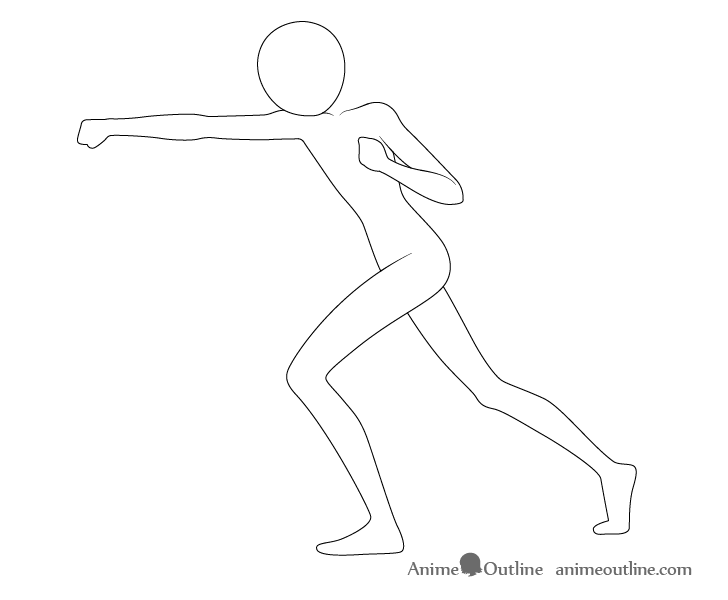
Draw the punching arm extended forward (hand in a fist) with the other arm pointing slightly backwards and it’s hand basically clenched to one side of the chest.
Step 5 – Draw the Neck
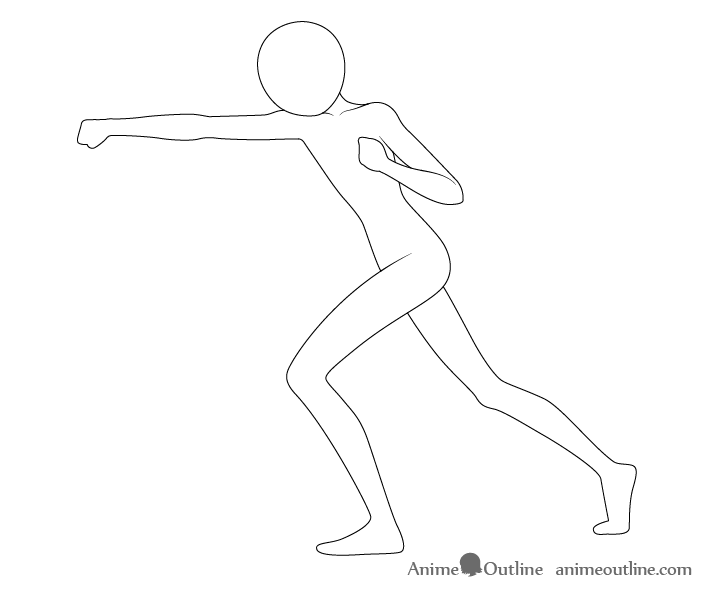
Draw the neck tilted slightly more forward than the angle of the body with it’s front part hidden by the chin.
Step 6 – Draw the Chest Details
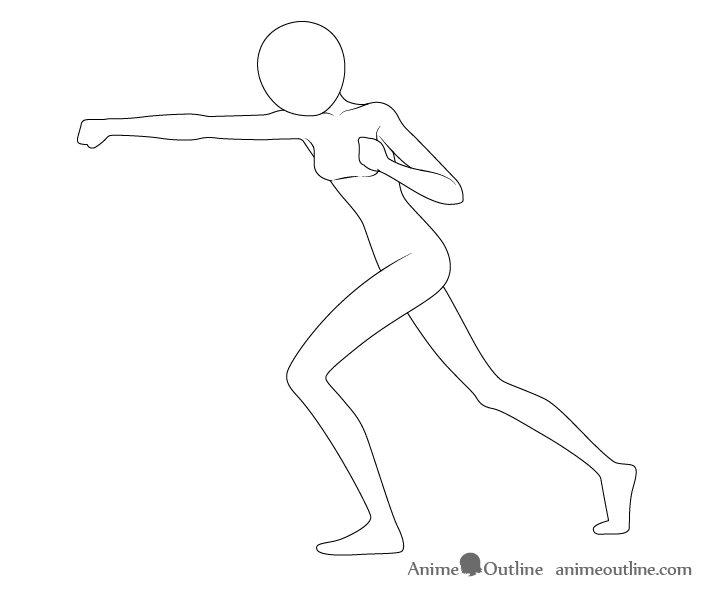
You can draw the breasts fairly normal slightly to one side of the chest to show that it’s being viewed on a angle. Again simply take into account that they will be squeezed by the clothes.
Drawing a Dashing Pose
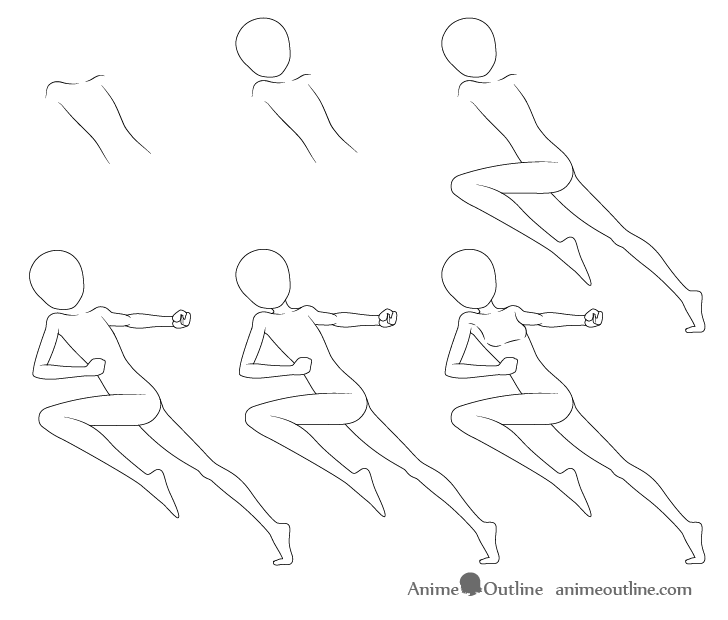
In this pose the character will be dashing forward winding up a strong punch. You can also do a similar pose if for an attack with a weapon like a sword or a club.
Step 1 – Draw the Torso
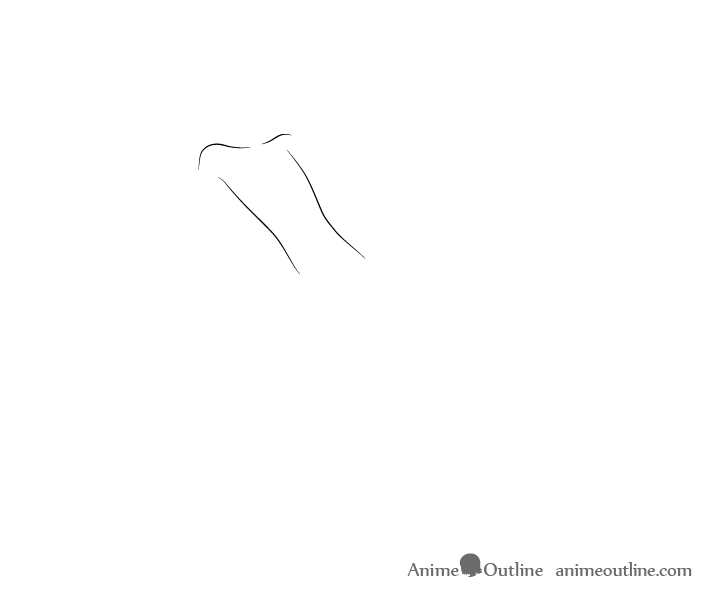
Like some other poses in this tutorial the entire body will again lean forward. As the character is swinging one arm backwards the torso will be twisted to face very slightly in the opposite direction to that of the dash. This type of pose may be slightly less realistic as it will probably be quite difficult to mimic in real life but sometime some exaggeration can help make a pose look more dramatic.
Step 2 – Draw the Head
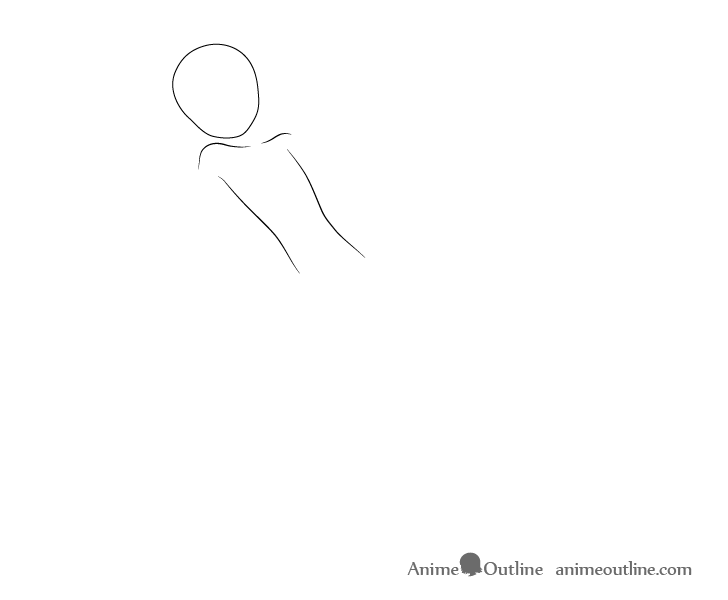
The head will be tilted forward just like the body (also facing the viewer) so draw it as shown in the example.
Step 3 – Draw the Legs
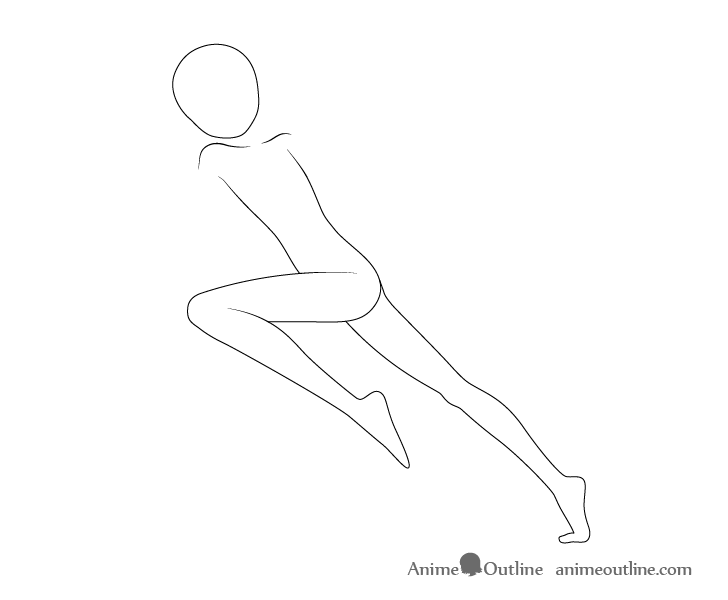
Similar to the running pose the front leg will be bent pointing forward with the back leg being straight and on the same angle as the rest of the body.
Draw the foot on the front leg tilted backwards so that it’s aligned with the leg.
Draw the hands clenched into fists.
Step 4 – Draw the Arms
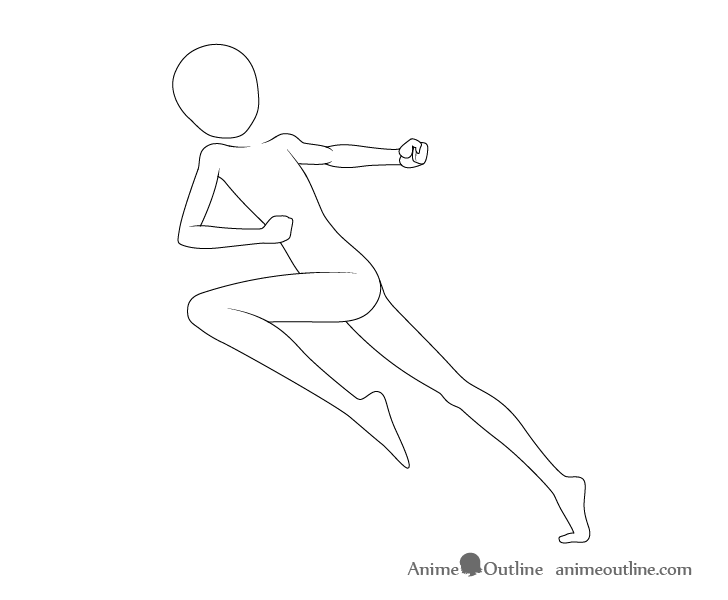
Draw the forward facing arm bent so that it’s elbow points forward (sort of a reverse bent of the forward leg). The back facing arm in this case will be bit tricky as it’s bent backwards as the character is taking a swing. To show this bend draw the elbow to shoulder part of the arm slightly shorter and project it’s outlines to “cut” into the elbow to wrist part.
Step 5 – Draw the Neck
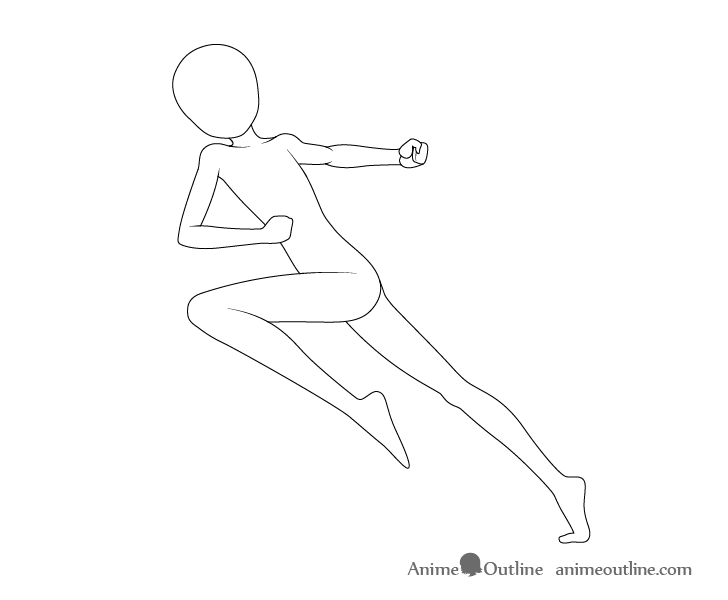
Draw the neck on pretty much the same angle as the body.
Step 6 – Draw the Chest Details
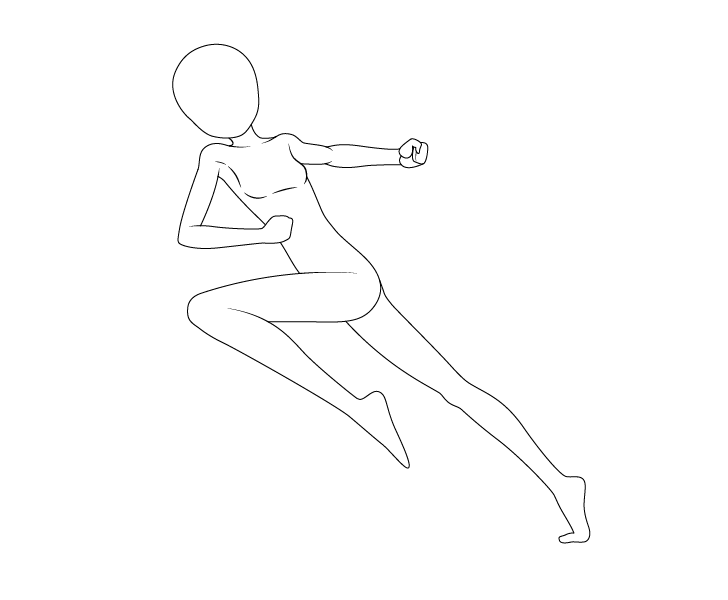
To show that the body is slightly twisted draw the breasts a little bit more towards the right of the picture.
Drawing a Kicking Pose
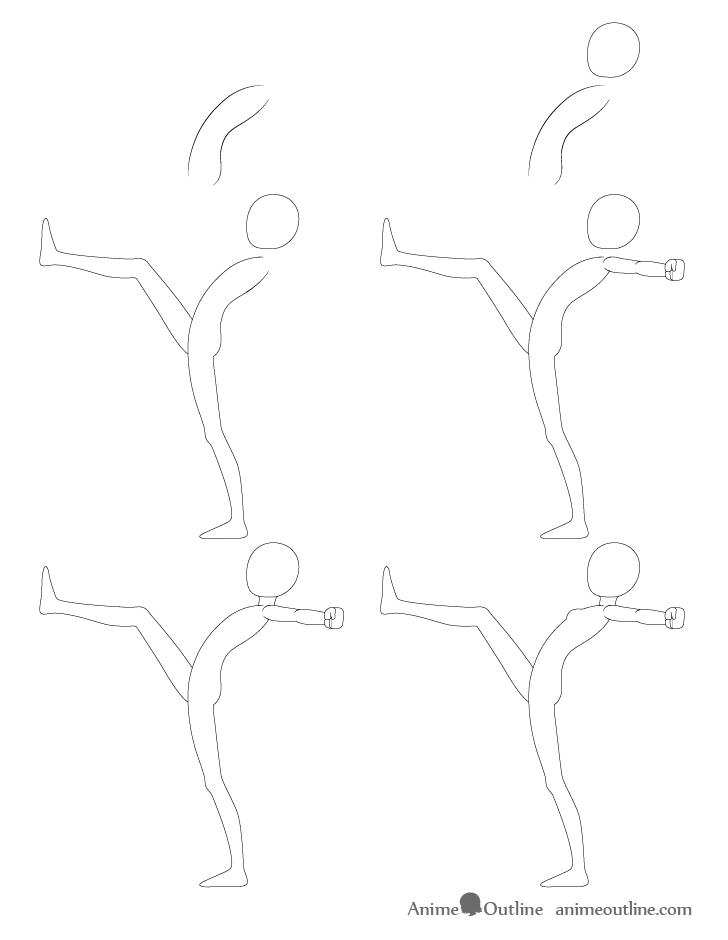
This is a straight up forward kick like the character is trying to kick something down.
Step 1 – Draw the Torso
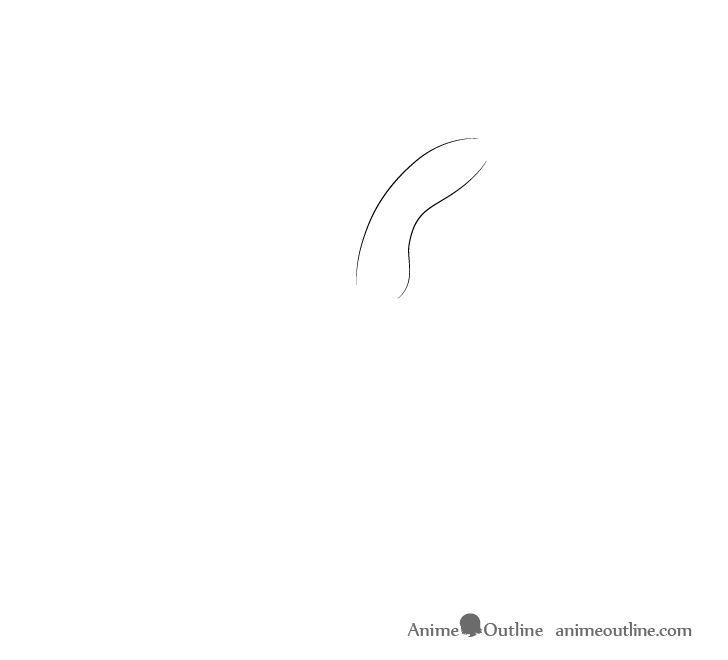
Draw the torso angled and slightly bent backwards. Make it narrower towards the middle/back area.
Step 2 – Draw the Head
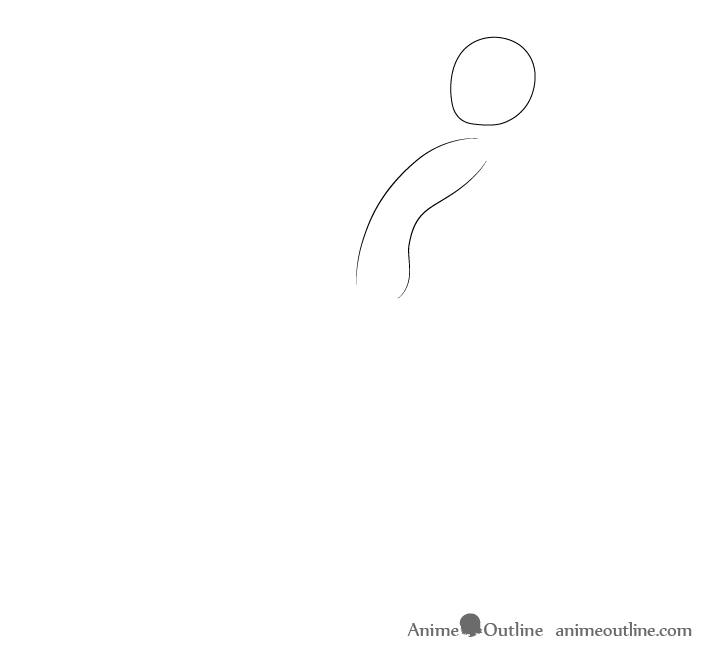
Draw the head tilted slightly backwards but not as much as the torso as the character will generally be looking forward/at the kicking foot.
Step 3 – Draw the Legs
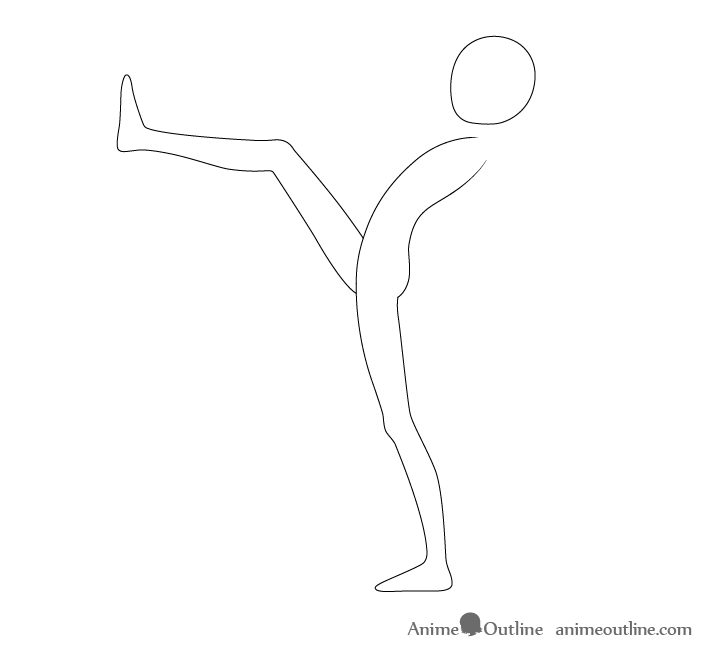
Draw the kicking leg raised and slightly bent with the other leg pretty much straight on a slightly angle. You can draw the kicking foot bent slightly backwards with the other foot flat on the ground.
Step 4 – Draw the Arms
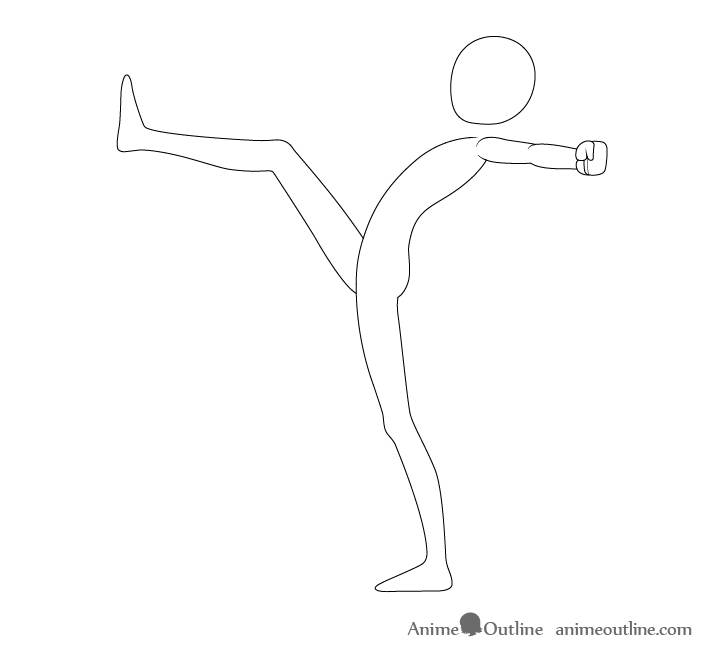
The arms or arm in this case will be facing backwards and slightly towards the viewer. To show this draw each of it’s parts shorter than if you were simply looking at directly from the side. Make the first than normal with at thicker than normal wrist. This will show a little bit of perspective where objects closer to the viewer appear larger.
For more on perspective drawing see:
Perspective Drawing Tutorial for Beginners and How it Relates to Anime
Step 5 – Draw the Neck
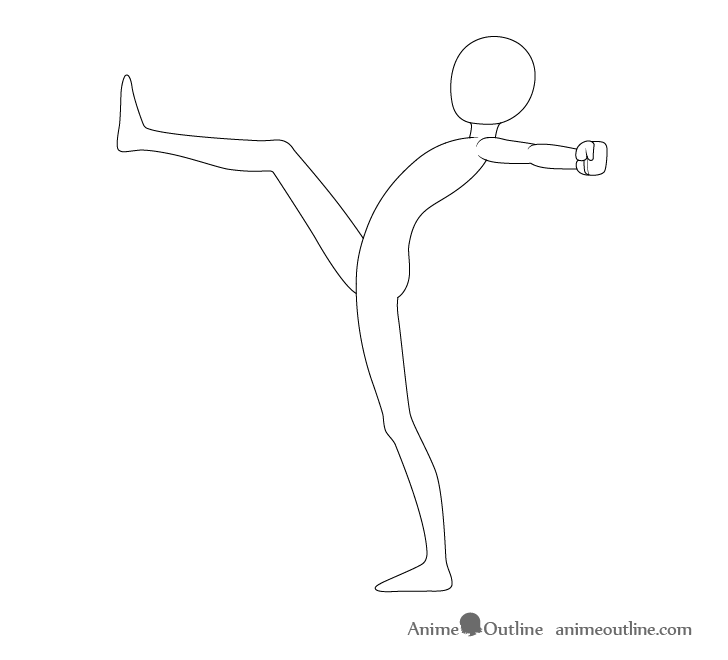
Draw the neck angled slighlty backwards.
Step 6 – Draw the Chest Details

Draw the chest fairly flat as it will be stretched out and squeezed by the clothes.
Drawing a Aiming Pose
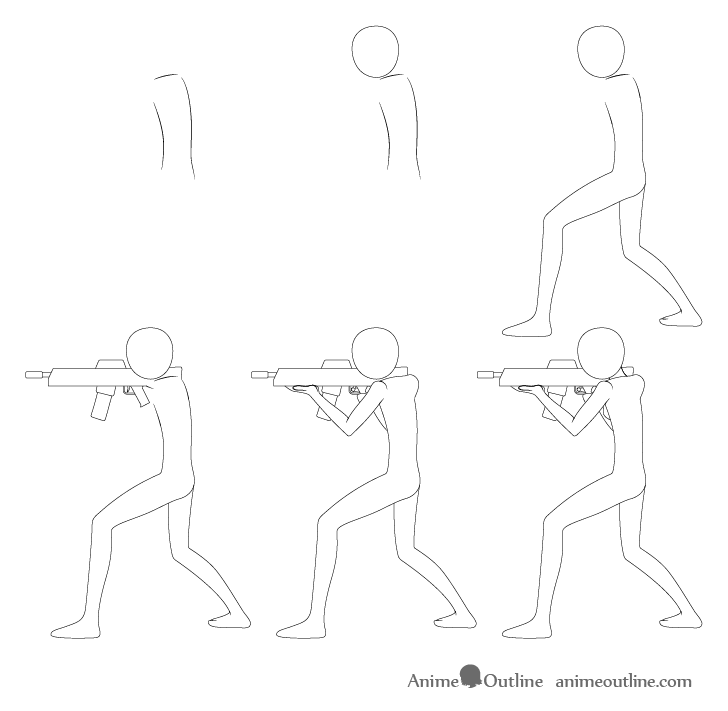
This pose is of a character aiming a gun. It can be common for a scenes like special forces storming a building.
In this case the gun is a fairly large rifle but a similar pose can also work for a hand gun. You would simply need to change the position of the arms.
Step 1 – Draw the Torso
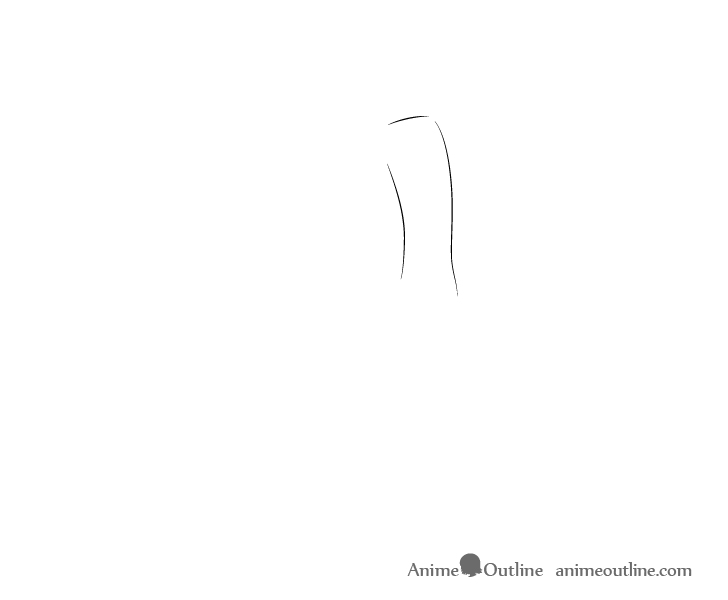
For this pose the character will be facing the viewer with a 3/4 view of their back.
Draw the torso with a bit of a curve to show that they are leaning forward.
Step 2 – Draw the Head
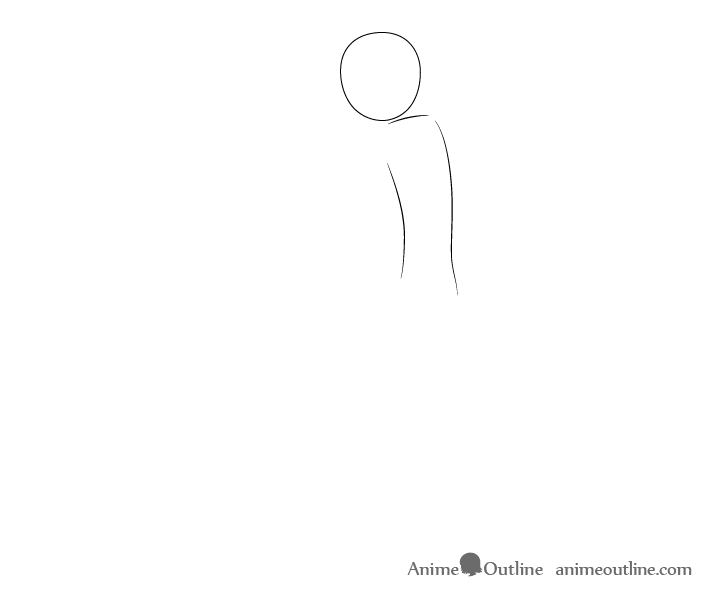
Draw the head lowered and very slightly tilted forward to show that the character is aiming.
Step 3 – Draw the Legs
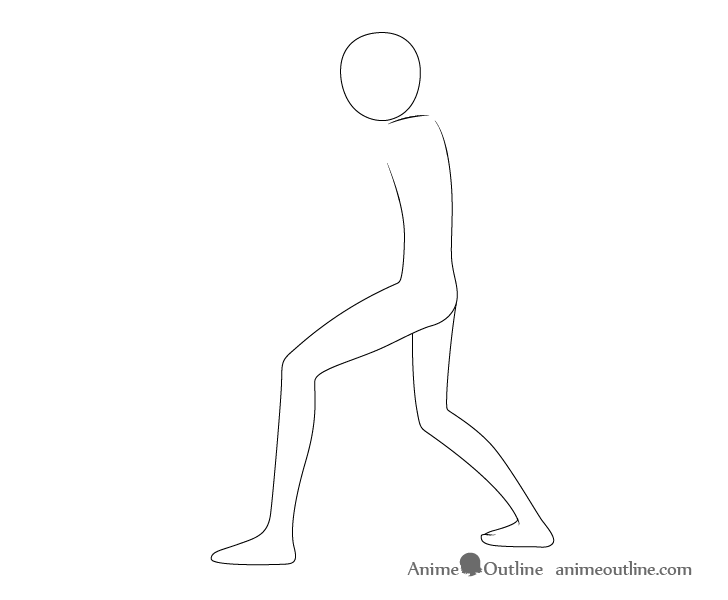
Draw the legs bent and a good distance apart with the feet flat on the ground. This will give the pose a stable appearance. This stability is generally needed to compensate for the recoil in case they have to fire the gun.
Step 4 – Draw the Gun
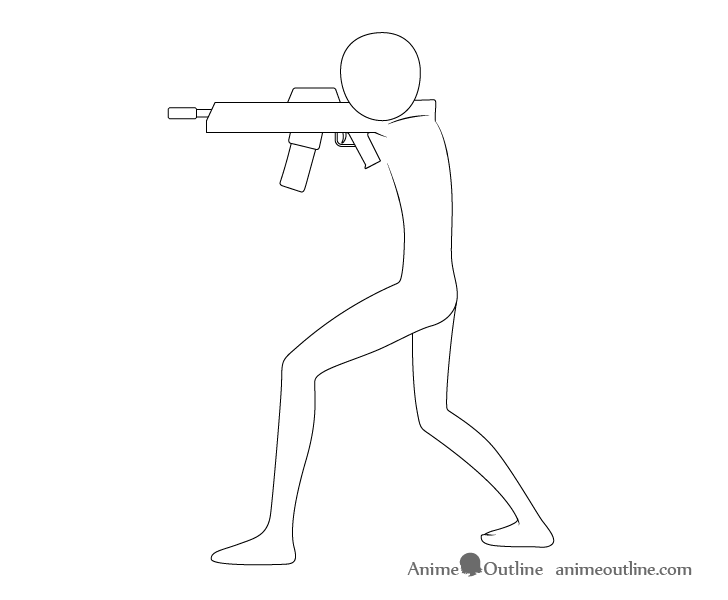
You can pretty much draw any rifle design you like for this pose as long as the shape is not too unusual. Position it so that it’s stock is pressing up against the shoulder area.
Step 5 – Draw the Arms
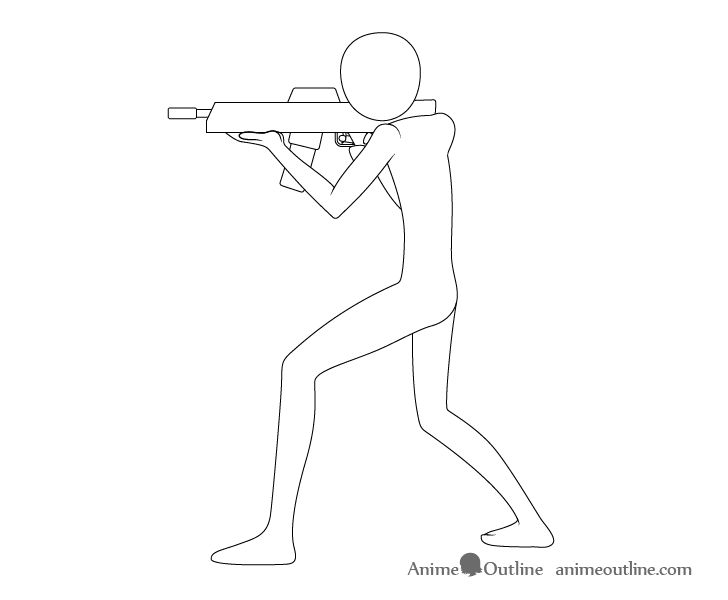
Once the rifle is drawn you can draw the arms over top of it and erase the parts covered by them afterwards. The placement of the arms will be determined by the shape of the rifle.
In this case one arm is on the handle and one arm close to the front.
While for most of the poses the hands are drawn as mittens for this particular pose you can actually draw out the trigger finger while still combining the rest.
For an up close example of how to draw a hand holding a gun see:
6 Ways to Draw Anime Hands Holding Something
Step 6 – Draw the Neck/Chest Details
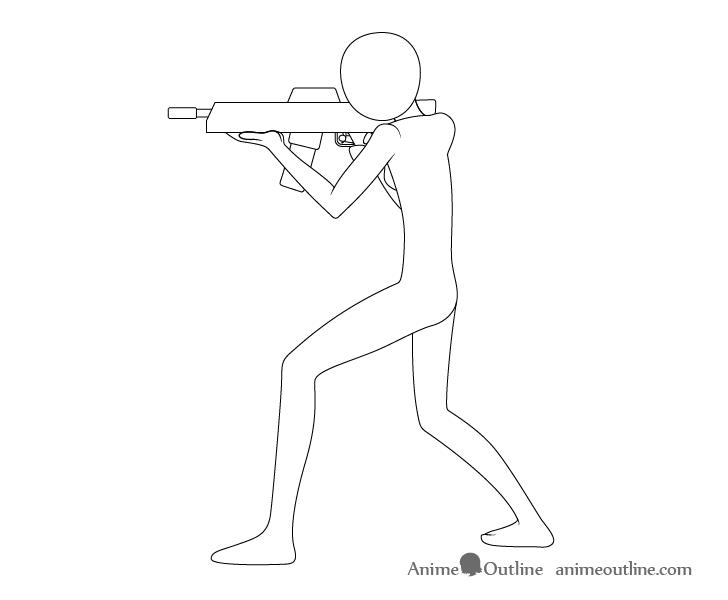
Finally you can add the neck (tilted forward) and a just a tiny bit of the breasts as they will be turned slightly away form the viewer.
Drawing a Throwing Pose
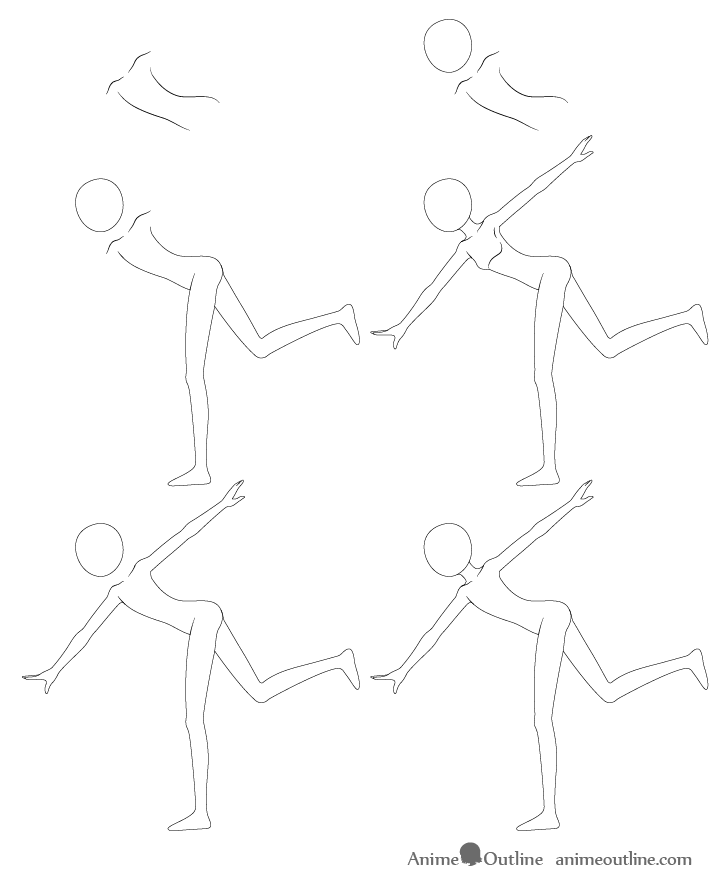
This is a light/playful throw kind of pose where the character is not really being aggressive.
Step 1 – Draw the Torso
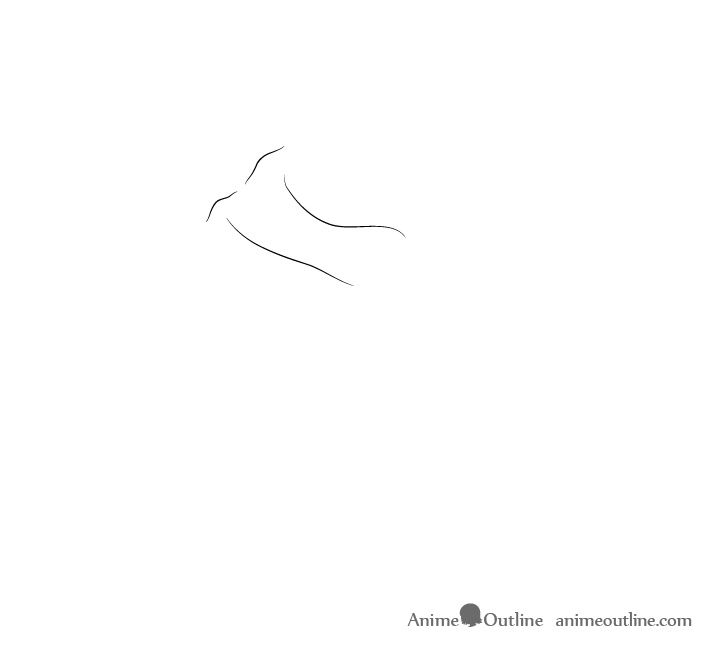
Draw the torso almost horizontal to the ground with a slight backwards bend. It will also have a bit of a twist that you can show by making it wider at the top and narrower towards the the middle curving inwards on both ends but more so at the back.
Step 2 – Draw the Head
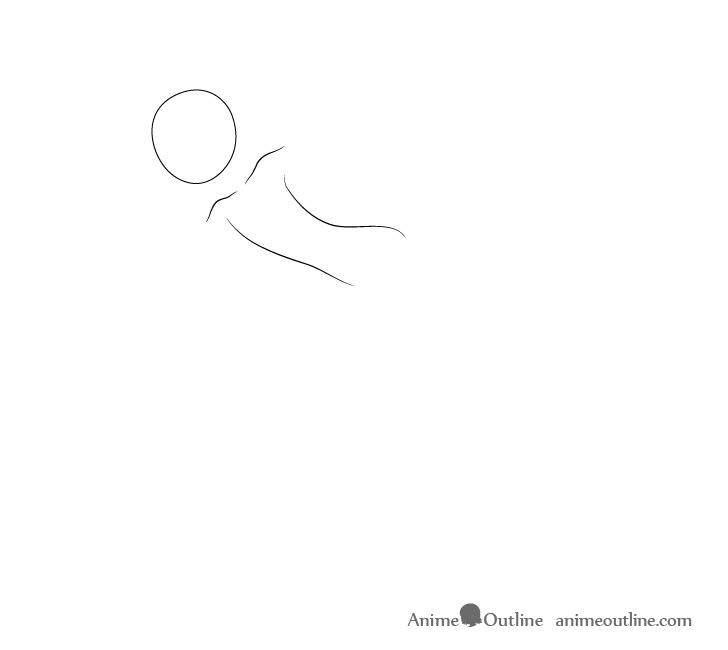
Draw the head tilted back (in relation to the torso) so that the character is pretty much looking forward.
Step 3 – Draw the Legs
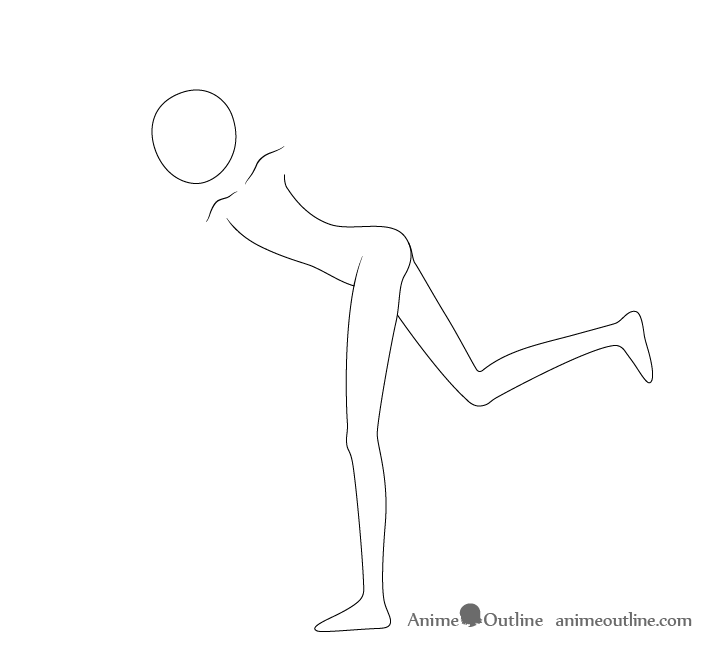
Draw the front leg very lightly bent with the back leg bent and lifted off of the ground. Make the foot of the front leg either be fully alight to the ground or just barely be on it’s toes. The foot of the back leg can pretty much be in a relaxed state.
Step 4 – Draw the Arms
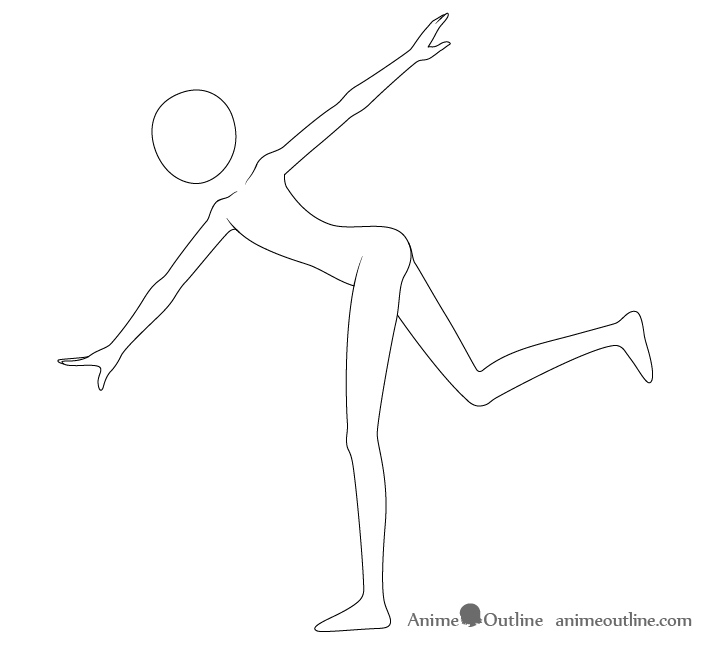
Draw the throwing arm facing forward at about a 45 degree angle and the other arm facing backwards in pretty much the opposite direction.
Make the fingers of the open arm point forward and the thumb downwards. This will create that “just threw something” gesture. You can draw a little more detail of the fingers in this pose as they are important in showing the throw.
Draw the other hand in a more relaxed state with its fingers slightly bent.
Step 5 – Draw the Neck
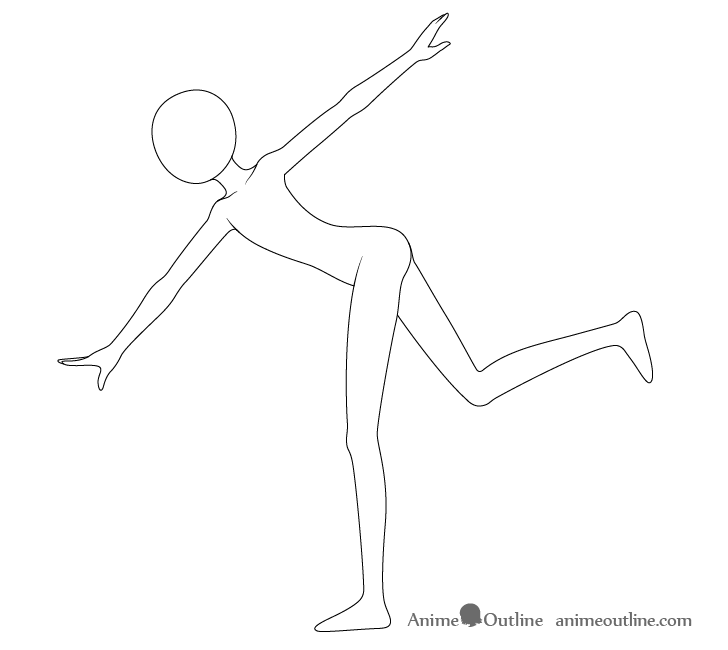
Draw the neck pretty much in line with the upper part of the body or tilted just a little bit backwards in relation to it.
Step 6 – Draw the Chest Details
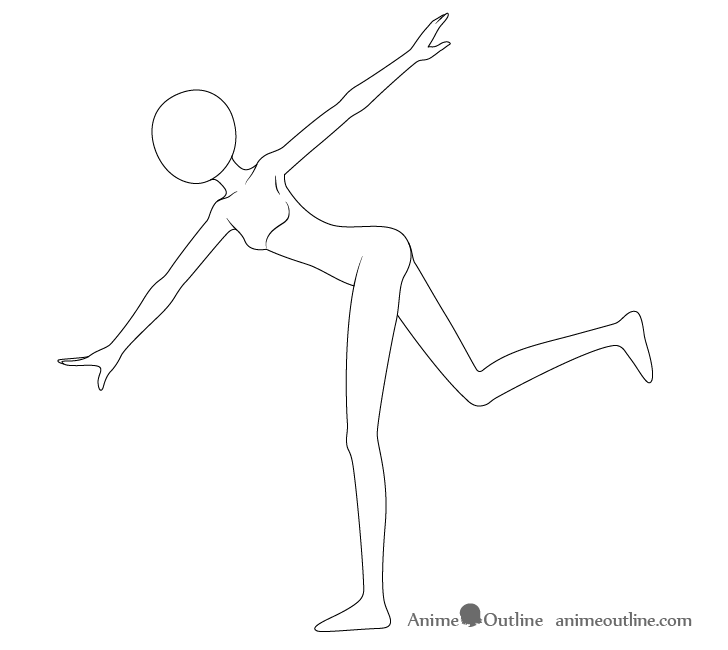
Draw the breasts slightly towards the throwing arm to show the body is being viewed on an angle.
Drawing a Leaping Pose
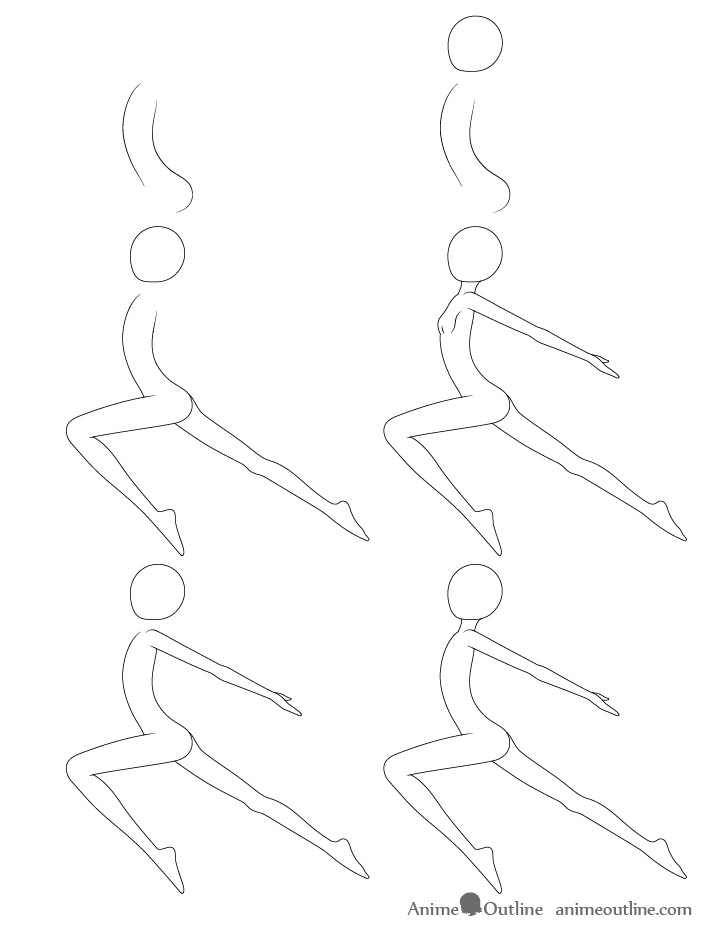
This is a dramatic looking leap pose that is somewhat similar to the ballet pose but with a few differences.
Step 1 – Draw the Torso

Draw the body tilted forwards but leaning backwards.
Step 2 – Draw the Head
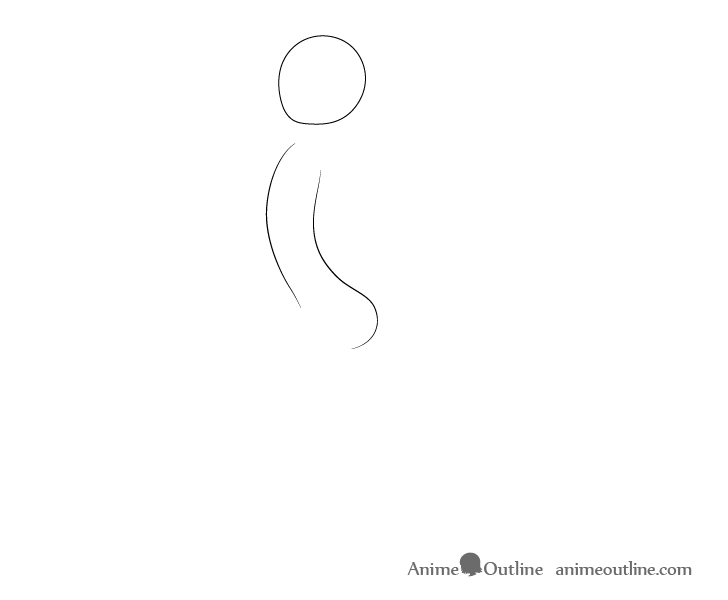
Draw the head tilted slightly backwards.
Step 3 – Draw the Legs
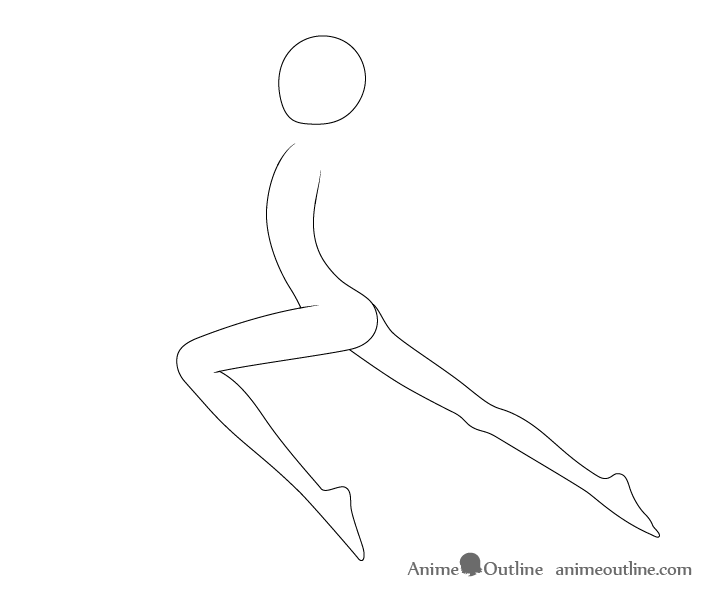
Make the forward food bent with it’s knee pointing forward and draw the back leg stretching out backwards. Draw the toes on both feet pointing down like a ballet dancer.
Step 4 – Draw the Arms
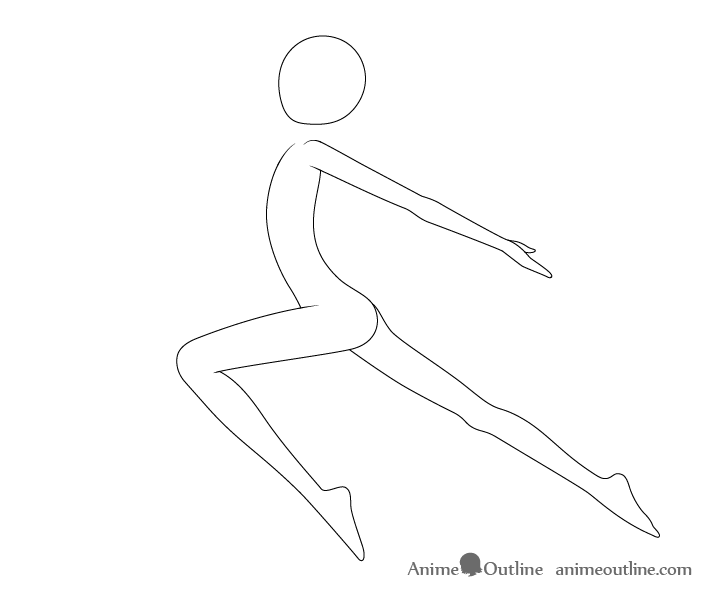
Draw the arm/arms stretched backwards with the palm of the hand pointing upwards. You will notice that only one arm is shown as the second arm can be hidden behind the first one.
Step 5 – Draw the Neck

Draw the neck tilted slightly backwards.
Step 6 – Draw the Chest Details
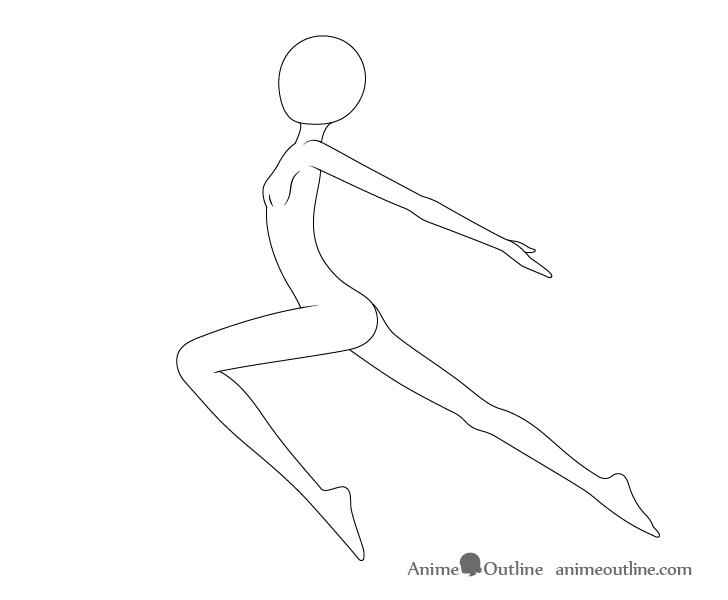
The chest in this pose will be only lightly stretched and facing just a tiny bit towards the viewer instead of directly forward.
Drawing a Flying Kick Pose
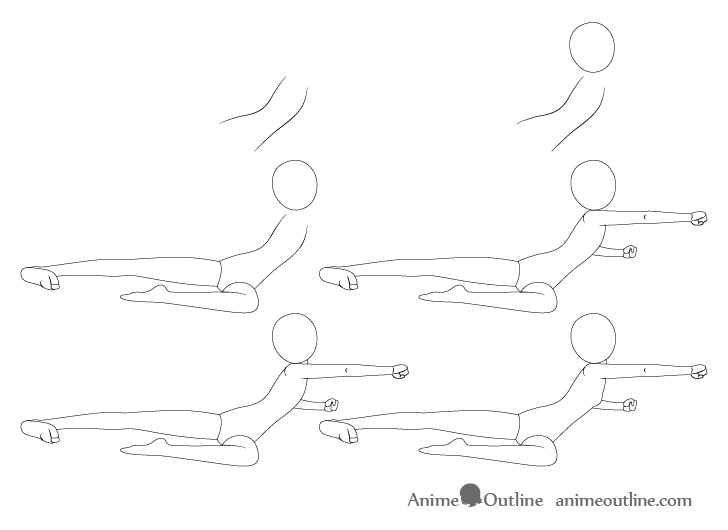
This type of flying kick pose can be used in martial arts/anime manga as well as comedy.
Step 1 – Draw the Torso
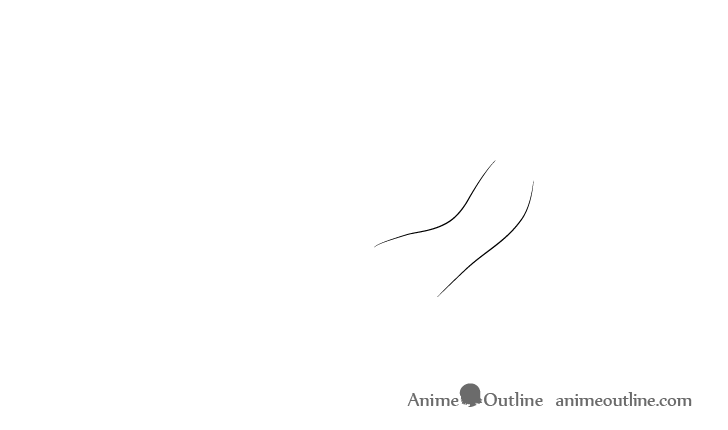
Draw the torso at about a 45 degree angle. In this pose it will have a bit of a bend and twist. Show this by making it narrower in the middle with both sides curving inwards (more so at the back).
Step 2 – Draw the Head
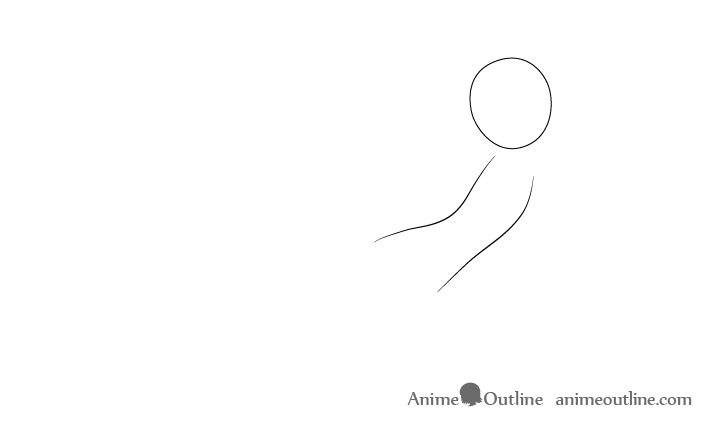
Draw the head tilted slightly forward as in this pose the character will generally be looking at the target of the kick.
Step 3 – Draw the Legs
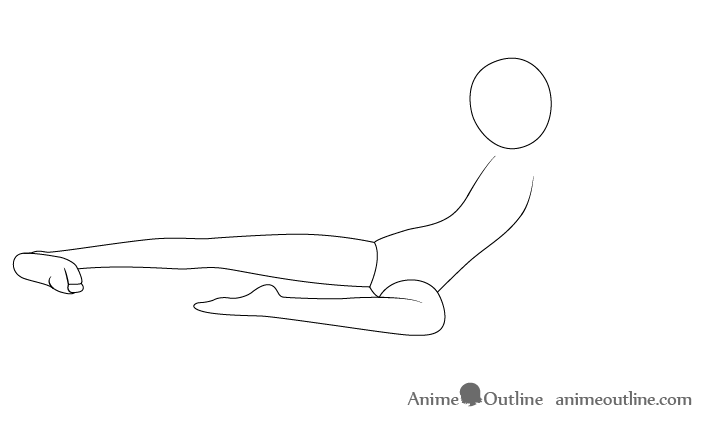
Draw the kicking leg stretched forward with the other leg bending so that it’s knee points slightly in the opposite direction of the kick.
You will want to draw the upper area of the leg (above the knee) shorter to show that it’s pointing towards the viewer.
Draw the foot of the kicking leg pulled back facing forward with it’s heel and draw the foot of the other leg pointing forward with it’s toes.
Step 4 – Draw the Arms
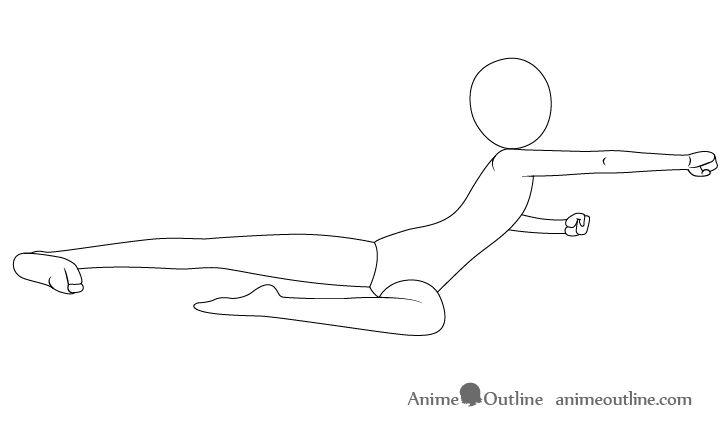
Draw the arm closer to the viewer pointing backwards with a slightly bend. To show the bend you can make the elbow to wrist area just a tiny bit shorter than normal with the elbow being just a tiny bit wider.
Step 5 – Draw the Neck
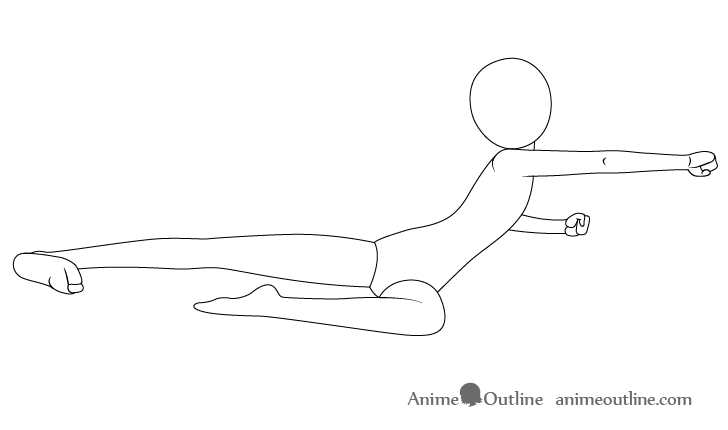
In this case the neck will be barely visible as a large part of it will be covered by the shoulder/arm.
Step 6 – Draw the Chest Details
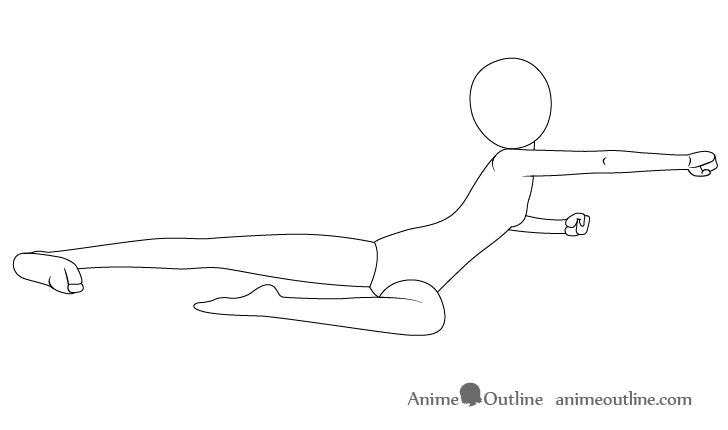
With this particular twist of the body the chest will be viewed from the side. This means you can draw the breasts as just one bump. Again keep in mind that the chest will also be squeezed by the clothes so it should be fairly flat.
Conclusion
Drawing poses can be very complicated. To make the drawing process simpler first drawn your characters in the poses you want with as few details as are needed to convey the pose. You can add the clothing, hair, facial features and other details afterwards.
When drawing the poses try and think of the various body parts and how they would move in that particular action or stance. You can also use reference material such as photos or the work of other artists.
For more similar tutorials also see:

